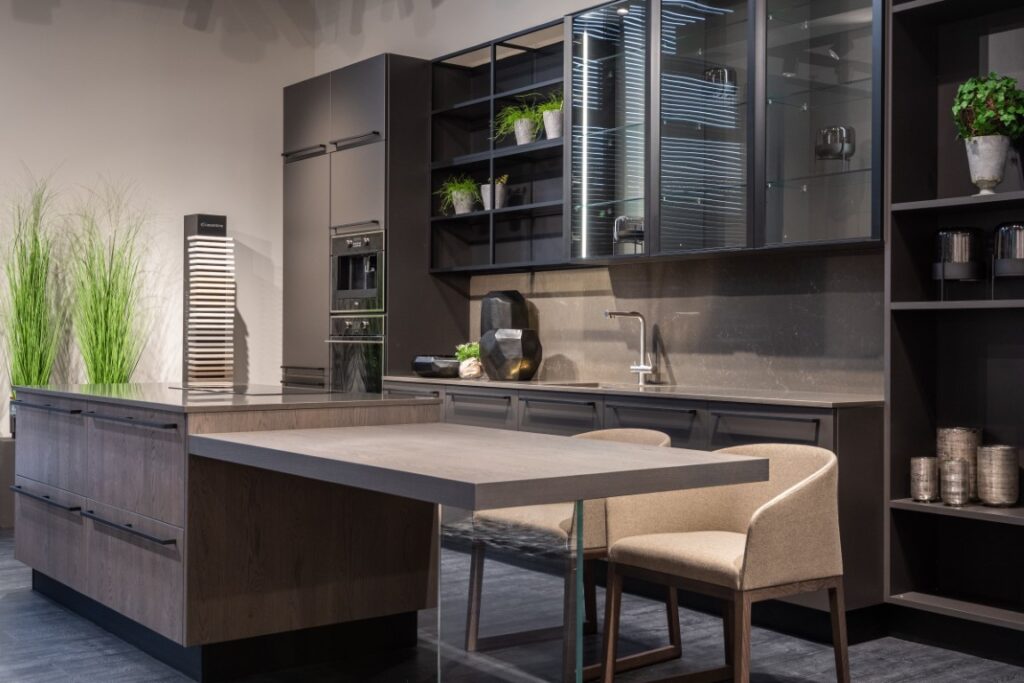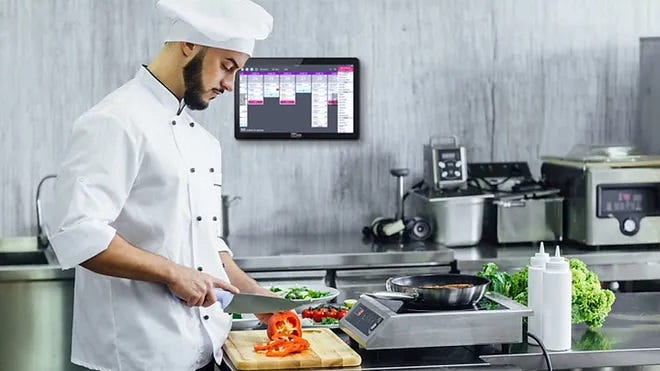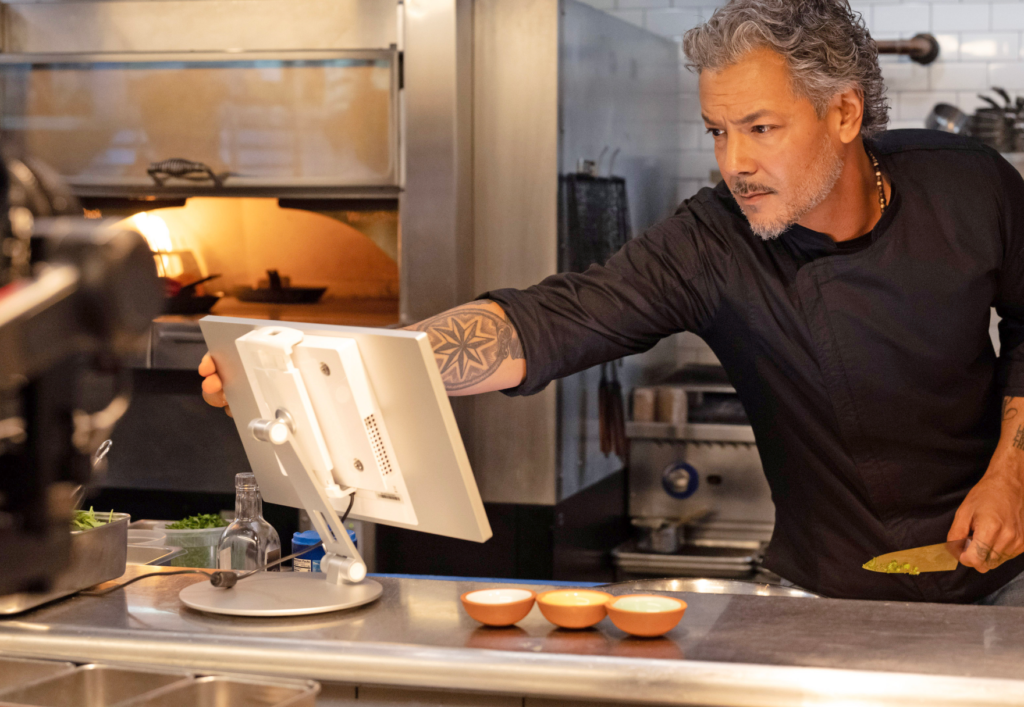In today’s fast-paced world, the intersection of technology and daily life continues to evolve, bringing forth innovations that streamline and enhance our everyday tasks. One such area experiencing a remarkable transformation is our kitchens, where the integration of smart appliances and artificial intelligence (AI) is reshaping the way we manage groceries. This article delves into the fascinating realm of tech-infused kitchens, exploring the impact of intelligent devices on grocery management and how they contribute to a more efficient and convenient culinary experience.
The Rise of Smart Refrigerators and Pantries

The heart of any kitchen is undoubtedly the refrigerator, and with the advent of smart technology, it has become a hub for innovation. Smart refrigerators are equipped with sensors that not only monitor temperature and humidity but also keep track of food inventory. This real-time tracking ensures that users are aware of what’s inside, reducing food waste and simplifying the grocery shopping process. Additionally, some models are integrated with AI algorithms that learn users’ preferences, suggesting recipes based on available ingredients and even providing nutritional insights.
Expanding further on smart refrigerators, their impact goes beyond mere inventory tracking. These appliances are becoming central to a connected kitchen ecosystem, communicating seamlessly with other smart devices. For instance, they can sync with smart ovens, suggesting optimal cooking settings based on the ingredients stored. This level of connectivity fosters a holistic approach to cooking, where appliances work in harmony to create a cohesive and efficient cooking environment. As we witness the rise of interconnected kitchens, the potential for collaborative functionality among smart appliances is bound to redefine the culinary landscape.
Moreover, the evolution of AI-driven pantries is redefining the traditional concept of food storage. These automated storage systems not only monitor inventory but can also suggest meal ideas based on available ingredients. Imagine receiving creative recipe suggestions tailored to the items in your pantry, inspiring culinary exploration and reducing the need for frequent grocery runs. The integration of AI in pantries exemplifies a shift toward a more proactive and personalized kitchen experience, where technology takes an active role in enhancing daily cooking routines.
AI-Powered Recipe Assistance
Imagine having a personal chef at your disposal, ready to assist you in creating culinary delights with the ingredients available in your kitchen. AI-powered recipe assistance is turning this vision into reality. Smart kitchen devices, such as interactive displays and voice-activated assistants, can guide users through recipes, offering step-by-step instructions and suggesting alternative ingredients. This not only fosters creativity in the kitchen but also caters to various dietary preferences and restrictions.
The evolution of AI-powered recipe assistance extends beyond basic guidance. These systems are now capable of analyzing individual cooking styles and preferences, adapting recipes on the fly to suit personal taste profiles. Imagine a virtual assistant that not only provides recipes but also tailors them to your preferred level of spiciness or sweetness. This level of customization adds a layer of personalization to the cooking experience, ensuring that each dish aligns perfectly with the user’s culinary preferences.
Furthermore, the integration of AI in recipe assistance is contributing to a global culinary exchange. Smart devices can recommend recipes inspired by diverse cuisines, introducing users to new flavors and cooking techniques. As users explore a world of culinary possibilities, the kitchen transforms into a dynamic space for cultural exploration and creative expression. In essence, AI-powered recipe assistance not only simplifies the cooking process but also elevates it into a journey of discovery and innovation.
Efficiency in Meal Planning and Grocery Shopping
The traditional grocery list is undergoing a digital transformation with the help of AI-driven meal planning and shopping assistance. Smart kitchen platforms can analyze the ingredients available, suggest recipes based on dietary preferences, and generate comprehensive shopping lists. This level of integration not only simplifies the planning process but also optimizes grocery shopping by ensuring that users purchase only what they need.
Delving deeper into efficiency in meal planning, AI-driven systems go beyond basic suggestions. They take into account factors such as expiration dates, helping users prioritize ingredients that need to be consumed sooner. This dynamic approach to meal planning not only reduces food waste but also promotes a healthier and more sustainable lifestyle. Users can confidently plan meals, knowing that the AI is assisting in creating balanced and nutritionally sound menus.
Moreover, the future of AI-driven grocery shopping holds the promise of enhanced connectivity with online platforms. Imagine a seamless integration where the smart kitchen not only generates a shopping list but also places the order directly with the preferred grocery store. This level of automation not only saves time but also ensures that users have a constant supply of fresh ingredients without the need for manual intervention. The marriage of AI and online grocery platforms is set to redefine the convenience and accessibility of procuring ingredients, making the kitchen experience more streamlined and user-friendly.
The Future of Tech-Infused Kitchens

As technology continues to advance, the possibilities for tech-infused kitchens are limitless. Future innovations may include AI-enhanced cooking robots, precision-controlled smart ovens, and further integration with online grocery platforms. The goal is to create a seamless and intuitive kitchen experience, where technology anticipates our needs and enhances our culinary capabilities.
In the realm of AI-enhanced cooking robots, the future holds the promise of devices that can not only assist in food preparation but also learn from user preferences and refine their techniques over time. Picture a robotic sous chef that adapts its chopping, sautéing, and seasoning techniques based on your culinary style. This level of sophistication in kitchen robotics not only brings efficiency to the cooking process but also adds an element of interactive collaboration between humans and machines in the culinary space.
Precision-controlled smart ovens represent another frontier in the future of tech-infused kitchens. Imagine an oven that can analyze the composition of a dish, adjusting temperature and cooking time to ensure perfect results. This level of precision not only guarantees consistently delicious meals but also empowers users to experiment with complex recipes, confident that the smart oven will handle the intricacies of the cooking process. The future of smart ovens lies in their ability to elevate home cooking to restaurant-quality standards, making gourmet experiences accessible to all.
Furthermore, the integration of tech-infused kitchens with online grocery platforms is expected to evolve into a seamless and comprehensive ecosystem. Future developments may include AI systems that not only generate shopping lists but also optimize them based on current promotions, discounts, and availability. Users can anticipate a level of integration where the kitchen not only informs the shopping process but actively collaborates with online platforms to ensure cost-effective and convenient procurement of ingredients.
Innovative Culinary Experiences Through Virtual Cooking Classes
Tech-infused kitchens are not only changing the way we manage groceries but also how we engage with culinary education. Virtual cooking classes, enhanced by AI, offer innovative experiences that transcend traditional learning methods. These classes leverage smart kitchen devices to provide real-time guidance, allowing participants to interact with professional chefs or culinary experts from the comfort of their homes. AI algorithms analyze participants’ cooking techniques, offering personalized tips and suggestions to enhance their skills.
Expanding on this, the interactive nature of virtual cooking classes fosters a sense of community among participants. Through live-streamed sessions, individuals can share their progress, ask questions, and collaborate on dishes, creating a dynamic and engaging learning environment. AI not only assists in the technical aspects of cooking but also curates class content based on participants’ preferences and skill levels, ensuring a tailored and enjoyable educational experience. The fusion of technology and culinary education opens up new possibilities for home cooks to explore diverse cuisines and techniques, fostering a global community of passionate food enthusiasts.
Sustainable Cooking with AI-Optimized Meal Plans
As environmental consciousness grows, tech-infused kitchens are embracing sustainability with AI-optimized meal plans. Smart kitchen platforms analyze the carbon footprint of ingredients, considering factors such as transportation, production, and packaging. By incorporating this data into meal planning algorithms, users receive suggestions that not only align with their dietary preferences but also contribute to a more sustainable lifestyle.
Taking this concept further, AI-optimized meal plans can guide users in making eco-friendly choices. For instance, the system may recommend plant-based alternatives or locally sourced ingredients to reduce environmental impact. The integration of sustainability metrics into meal planning not only benefits the planet but also empowers users to make informed choices that align with their values. The tech-infused kitchen becomes a catalyst for environmentally conscious cooking, inspiring individuals to reduce their ecological footprint without compromising on taste or nutrition.
Smart Appliances and Health-Tracking in the Modern Kitchen
The evolution of tech-infused kitchens goes beyond culinary convenience, extending into the realm of health and wellness. Smart appliances are now equipped with health-tracking features that monitor nutritional intake and suggest personalized dietary adjustments. For instance, a smart blender may recommend nutrient-rich smoothies based on an individual’s daily nutritional needs, while a smart oven can suggest cooking methods that retain the maximum nutritional value of ingredients.
Delving deeper, these health-tracking features can integrate with wearable devices and health apps, creating a comprehensive ecosystem for holistic well-being. Smart kitchens become active participants in users’ health journeys, providing insights into nutritional trends, suggesting recipes aligned with fitness goals, and even offering reminders for hydration or meal timings. The intersection of technology and health in the kitchen transforms cooking from a mere culinary activity into a wellness-oriented lifestyle, empowering individuals to make conscious choices for their overall health.
Culinary Collaboration in the Cloud: The Future of Recipe Sharing

The future of tech-infused kitchens involves a shift towards collaborative culinary experiences in the cloud. Smart kitchen platforms are evolving to allow users to share their favorite recipes, cooking tips, and culinary creations seamlessly. AI algorithms curate a personalized recipe feed for each user based on their preferences, incorporating recommendations from friends, family, and the global culinary community.
Expanding on this, the cloud-based culinary collaboration extends beyond mere recipe sharing. Users can virtually cook together, with synchronized guidance from AI assistants, creating a shared cooking experience despite physical distances. This collaborative approach fosters a sense of connection and creativity in the kitchen, as individuals explore diverse recipes, techniques, and cultural influences. The kitchen becomes a virtual gathering space, where culinary enthusiasts collaborate, learn, and share their love for cooking in a digital age.
Conclusion: Embracing the Culinary Future with Tech-Infused Kitchens
In conclusion, the journey through the realm of tech-infused kitchens reveals a dynamic landscape of innovation, collaboration, and sustainability. From virtual cooking classes and AI-optimized meal plans to health-tracking features and cloud-based culinary collaboration, the possibilities are vast. As we embrace this culinary future, the intersection of technology and the art of cooking promises a holistic and enriching experience for individuals around the world. The kitchen becomes more than just a space for meal preparation; it becomes a hub of creativity, connection, and conscious living. With every advancement, tech-infused kitchens redefine our relationship with food, transforming it into a delightful and evolving journey of exploration and self-expression.
